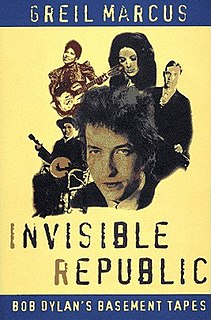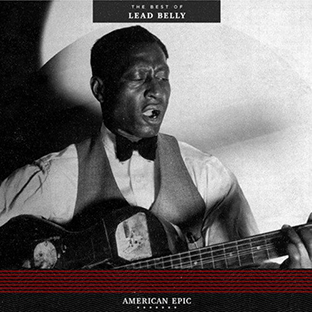
Huddie William Ledbetter, better known by the stage name Lead Belly, was an American folk and blues singer, musician, and songwriter notable for his strong vocals, virtuosity on the twelve-string guitar, and the folk standards he introduced, including his renditions of "In The Pines", "Goodnight, Irene", "Midnight Special", "Cotton Fields", and "Boll Weevil".

The Anthology of American Folk Music is a six-album compilation released in 1952 by Folkways Records, comprising eighty-four American folk, blues and country music recordings that were originally issued from 1926 to 1933. The album was compiled from experimental film maker Harry Smith's own personal collection of 78 rpm records. The album did not initially gain significant recognition as it sold poorly and had no notable early coverage besides a minor 1958 mention in Sing Out!. The album has since received critical praise, with critics noting Smith's method of sequencing tracks, along with his inventive liner notes.
"The Bourgeois Blues" is a blues song by American folk and blues musician Lead Belly. It was written in June 1937 in response to the discrimination and segregation that he faced during a visit to Washington, D.C. to record for Alan Lomax. It rails against racism, the Jim Crow laws, and the conditions of contemporary African Americans in the southern United States. The song was recorded in December 1938 for the Library of Congress and re-recorded in 1939 for commercial release.

Mike Seeger was an American folk musician and folklorist. He was a distinctive singer and an accomplished musician who played autoharp, banjo, fiddle, dulcimer, guitar, mouth harp, mandolin, dobro, jaw harp, and pan pipes. Seeger, a half-brother of Pete Seeger, produced more than 30 documentary recordings, and performed in more than 40 other recordings. He desired to make known the caretakers of culture that inspired and taught him.
"He Never Said a Mumblin' Word" is an American Negro Spiritual folk song.
"Grey Goose" is a traditional American folk song. Its subject is a preacher who hunts and captures a grey goose for dinner on a Sunday. He tries to kill the goose prior to eating it, but no matter how hard he tries, he cannot kill it, the implication being that he had not properly observed the Sabbath. The various methods the preacher used to unsuccessfully kill the grey goose were, in order according to the song:
Smithsonian Folkways is the nonprofit record label of the Smithsonian Institution. It is a part of the Smithsonian's Smithsonian Center for Folklife and Cultural Heritage, located at Capital Gallery in downtown Washington, D.C. The label was founded in 1987 after the family of Moses Asch, founder of Folkways Records, donated the entire Folkways Records label to the Smithsonian. The donation was made on the condition that the Institution continue Asch's policy that each of the more than 2,000 albums of Folkways Records remain in print forever, regardless of sales. Since then, the label has expanded on Asch's vision of documenting the sounds of the world, adding six other record labels to the collection, as well as releasing over 300 new recordings. Some well-known artists have contributed to the Smithsonian Folkways collection, including Pete Seeger, Ella Jenkins, Woody Guthrie, and Lead Belly. Famous songs include "This Land Is Your Land", "Goodnight, Irene", and "Midnight Special". Due to the unique nature of its recordings, which include an extensive collection of traditional American music, children's music, and international music, Smithsonian Folkways has become an important collection to the musical community, especially to ethnomusicologists, who utilize the recordings of "people's music" from all over the world.

Invisible Republic: Bob Dylan's Basement Tapes (1997) is a book by music critic Greil Marcus about the creation and cultural importance of The Basement Tapes, a series of recordings made by Bob Dylan in 1967 in collaboration with the Hawks, who would subsequently become known as the Band. (ISBN 0-8050-5842-7)
"Take a Whiff on Me" is an American folk song, with references to the use of cocaine. It is also known as "Take a Whiff ", "Cocaine Habit", and "Cocaine Habit Blues".
"Mr. Hitler" or "Hitler Song"' is a blues song written by Huddie 'Lead Belly' Ledbetter about German chancellor Adolf Hitler released in 1942.
Folkways Records was a record label founded by Moses Asch that documented folk, world, and children's music. It was acquired by the Smithsonian Institution in 1987 and is now part of Smithsonian Folkways.
Moses Asch, often known as Moe Asch, was an American recording engineer and record executive. He founded Asch Records, which then changed its name to Folkways Records when the label transitioned from 78 RPM recordings to LP records. Asch ran the Folkways label from 1948 until his death in 1986. Folkways was very influential in bringing folk music into the American cultural mainstream. Some of America's greatest folk songs were originally recorded for Asch, including "This Land Is Your Land" by Woody Guthrie and "Goodnight Irene" by Lead Belly. Asch sold many commercial recordings to Verve Records; after his death, Asch's archive of ethnic recordings was acquired by the Smithsonian Institution, and released as Smithsonian Folkways Records.

Woody At 100: The Woody Guthrie Centennial Collectionis a 150-page large-format book with 3 CDs containing 57 tracks, including Woody Guthrie's most important recordings such as the complete version of "This Land Is Your Land," "Pretty Boy Floyd," "I Ain't Got No Home in This World Anymore," and "Riding in My Car." The set also contains 21 previously unreleased performances and six never-before-heard original songs, including Woody's first known—and recently discovered—recordings. It is an in-depth commemorative collection of songs, photos and essays released by Smithsonian Folkways in June 2012.
My Dusty Road is a 4 CD box set of Woody Guthrie music containing 54 tracks and a book. It is a collection of the newly discovered Stinson master discs. It was released by Rounder Records in 2009.
Stinson Records was an American record label formed by Herbert Harris and Irving Prosky in 1939, initially to market, in the US, recordings made in the Soviet Union. Between the 1940s and 1960s, it mainly issued recordings of American folk and blues musicians, including Woody Guthrie and Josh White.

Trouble in Mind is an album by American blues musician Big Bill Broonzy. It was released on February 22, 2000 by Smithsonian Folkways. The album consists of traditional folk, blues, and spiritual songs featuring Broonzy accompanying himself on acoustic guitar and a guest appearance by Pete Seeger. Suffering from cancer, Broonzy realized his time was limited and hence recorded extensively between 1956 and 1957. While most of the work draws from the album Big Bill Broonzy Sings Country Blues (1957), arranged by Moses Asch and Charles Edward Smith, Trouble in Mind is also sourced from concert broadcasts and interviews recorded late in Broonzy's career.
Jeff Place is the Grammy-award-winning Archivist and Curator at the Smithsonian Center for Folklife and Cultural Heritage. He and Anthony Seeger were the first two full-time employees hired in 1987 when the Smithsonian acquired Folkways Records from the estate of Folkways founder Moses Asch.

American Epic: The Best of Lead Belly is a compilation of Lead Belly's first commercial recordings made in 1935 and released in 2017 to accompany the award-winning American Epic documentary film series. The album was released as a 14-track download and a vinyl LP.

Lead Belly Sings for Children is a compilation album by American folk and blues singer Lead Belly. It was released in 1999 by Smithsonian Folkways.

Negro Folk Songs is an album by Lead Belly, recorded in 1943 and released as an album in early 1946.









